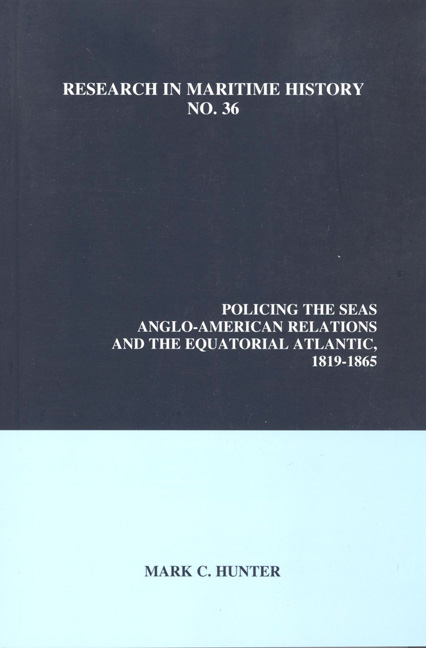Book contents
- Frontmatter
- Contents
- List of Tables
- List of Illustrations
- About the Author
- Acknowledgements
- Chapter 1 Introduction
- Chapter 2 The Atlantic
- Chapter 3 Anglo-American Policymaking, 1819-1834
- Chapter 4 Naval Relations and the Suppression of Piracy and Slaving, 1820-1830
- Chapter 5 A Naval Compromise, 1830-1842
- Chapter 6 The Royal Navy and West Africa, 1843-1857
- Chapter 7 The US Navy and West Africa, 1843-1857
- Chapter 8 Conflict Avoidance in the Equatorial Atlantic
- Chapter 9 The Civil War and Conflict Resolution in the Equatorial Atlantic
- Select Bibliography
Chapter 6 - The Royal Navy and West Africa, 1843-1857
- Frontmatter
- Contents
- List of Tables
- List of Illustrations
- About the Author
- Acknowledgements
- Chapter 1 Introduction
- Chapter 2 The Atlantic
- Chapter 3 Anglo-American Policymaking, 1819-1834
- Chapter 4 Naval Relations and the Suppression of Piracy and Slaving, 1820-1830
- Chapter 5 A Naval Compromise, 1830-1842
- Chapter 6 The Royal Navy and West Africa, 1843-1857
- Chapter 7 The US Navy and West Africa, 1843-1857
- Chapter 8 Conflict Avoidance in the Equatorial Atlantic
- Chapter 9 The Civil War and Conflict Resolution in the Equatorial Atlantic
- Select Bibliography
Summary
By the 1840s the Royal Navy (RN) was deployed along the West African coast to further long-term British objectives to suppress the slave trade and, short of war, to relate to other powers. The RN was one of the main instruments of British trade policy and, unlike in the US, humanitarian efforts merged with trade and strategic goals. At home, the government had to overcome the demands of radical free traders to disband the squadron and allow unfettered commerce, even if slave produced. But the government supported those who felt that only slave-trade suppression would encourage legitimate commerce. A unified West African strategy suited the nation's economic and strategic needs. Consequently, RN activities were different than those of the US Navy (USN), although both shared the belief that sea power could further long-term goals peacefully. Their different strategies created the conditions under which Anglo- American tension might rise.
In Britain the elite secured its objective of using sea power to push African “factors of production” away from the slave trade and into legitimate commerce. The RN also eagerly signed trade treaties with natives to match similar French activities and counter its traditional rival. The British installed sympathetic native leaders, as at Lagos in 1851, and enforced agreements with recalcitrant chiefs. As a result, the British captured 634 slavers, dwarfing the American effort during the same period. But London also wanted peace maintained with other nations and selected naval officers for the West African coast, like Sir Charles Hotham, with a reputation for diplomacy. Nevertheless, British actions reinforced American fears that it sought to dominate the coast, while Britain believed that US involvement in the slave trade was growing. Mutual suspicion increased Anglo-American tension and created the potential for an Atlantic-wide war, with France and America allied against Britain, a scenario the British wanted to avoid.
The Abolitionist North and Free Traders
In Britain, there were divergent views on the economics and morality of slavery that the government strove to overcome. It found support from the abolitionists for a West African policy that involved the suppression of the slave trade and the encouragement of legitimate commerce.
- Type
- Chapter
- Information
- Policing the SeasAnglo-American Relations and the Equatorial Atlantic, 1819-1865, pp. 133 - 168Publisher: Liverpool University PressPrint publication year: 2008



